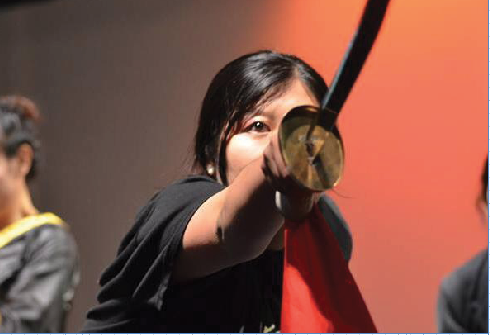Of the many cultural organizations on campus, Wellesley Wushu has remained a strong group over the years. Wushu, a Chinese martial art involving various movements of the body, is a sport, an art and a significant part of the national Chinese identity. Wushu is often found in Chinese martial arts films and Wu Xia stories — a genre of fiction involving the adventure of traveling martial artists. It is no wonder that Wellesley Wushu attracts many students to the org each year. Emily Jin ’17, the recently elected president of the organization, recounts how Wellesley Wushu has changed her college experience.
Joining Wushu was, as Emily recounts, her “own way of fulfilling a childhood dream.” Although she had grown up with a Chinese cultural background and had always read martial arts novels in China, she had never had obtained any experience prior to coming to Wellesley. “Wushu was always something that I was interested in, but I never had the chance to do when I was still going to school in China.”
Upon deciding to give Wellesley Wushu a try however, Emily was captivated by both the artistic beauty and heroic spirit of the ancient martial art. From an artistic point of view, the act of wushu turns the human body into a medium from which creativity is expressed. Wushu involves spinning weapons, twisting the body and jumping high in the air ending with a split, all of which require tremendous movement and coordination. “As someone without a dance or gymnastics background, I only did racket sports and was oblivious as to why the human body could be an art,” Emily recounts. “But it’s about what you can do with your own body.”
It is no surprise that achieving the perfection of movement requires a tremendous amount of practice and endurance. Members practice four hours a week standard, with two drills amounting to eight hours in total. Close to performance time, members must attend extra practices. During practice, drills involve running, extensive muscle training, frog jumps, relay resources and choreo practice.
“I did wushu for maybe twelve days in a row prior to our own show,” Emily admits. She doesn’t limit herself.
The practice has indeed all paid off. Wellesley Wushu’s year started off with an choreographed act based on “Game of Thrones.” The general themes of war, battle and legends were carried further by the other acts in the show, including a showcase of weaponry and “The Monkey King” or “Journey to the West,” China’s most famous legend. “This year was the year of the monkey in China, and we realized that we’ve never properly done any Asian legend,” Emily explains. “In the ‘Journey to The West,’ the monkey uses a staff and the staff is one of the most common wushu weapons.” The introduction of Asian folklore to campus was a breath of fresh air to the performance and, more importantly, promoted multiculturalism.
Crafting the choreography is also hard work. Wushu performances always narrate a story, all through the movement of the body. “We use our body and weapon language to present different themes and elements of stories.” In their most recent Slater Fall Cultural Show, the team crafted choreography representing “Game of Thrones.”
“To present the brute, down-to-earth Stark family traits, we created a choreography being represented by fists,” explains Emily. “On the other hand, to represent the Lannister family, we used swords to represent their sharpness and calculating traits.” To tell stories without using verbal language and only the choreography of the body is an artistic feat in and of itself.
Wushu is an organization that is many things to Emily—a venue for creativity, a celebration of multiculturalism and a test of endurance. But what does she treasure the most about Wellesley Wushu? “The reason I stayed in the team is because of the people.” It was clear that ultimately, her appreciation for her team members and her desire to give back to the team was her most important goal upon becoming president. “I want to give to everyone what wushu has given me.” For Emily, the team represents more than just a martial arts organization, but a family at Wellesley.
This support system was proven in her sophomore year, when after she had undergone a surgery, her team members took extra steps to help her recover. Touched by this experience, her goals as president are to help out the new members of Wushu, ease their way into Wellesley and continue the support system of Wellesley Wushu. In her agenda as president, she plans to teach wushu and make sure that everyone gets an equal amount of attention. “It’s really my way of giving back to the team.”
In Wu Xia, the “Xia” refers to those who use their learned skills to help others. This value is deeply embedded in a sense of heroism and helping those in need. At Wellesley, Emily embraces the meaning of martial arts in China and hopes to pass down this great responsibility of helping others. The team is truly a support system within Wellesley’s own community, a family of friends to fall back on. The spirit of Wushu celebrates the heroism in all of us. Emily knows that even through hard times, the members of Wellesley Wushu will always be there to welcome her with open arms.



